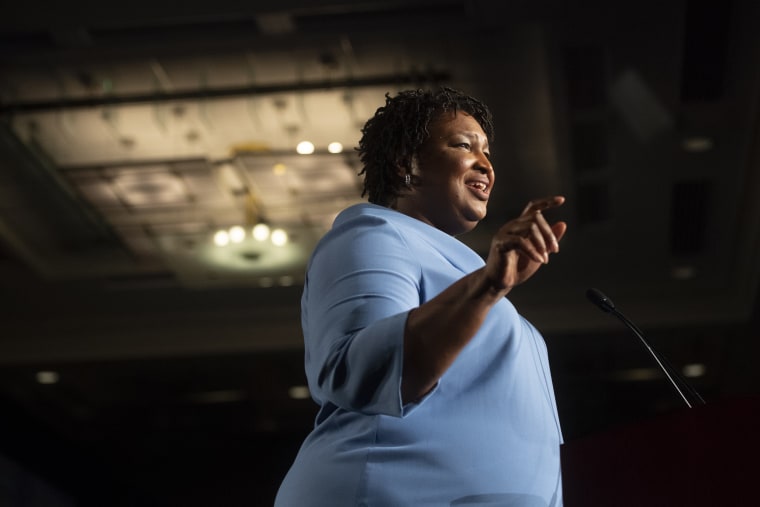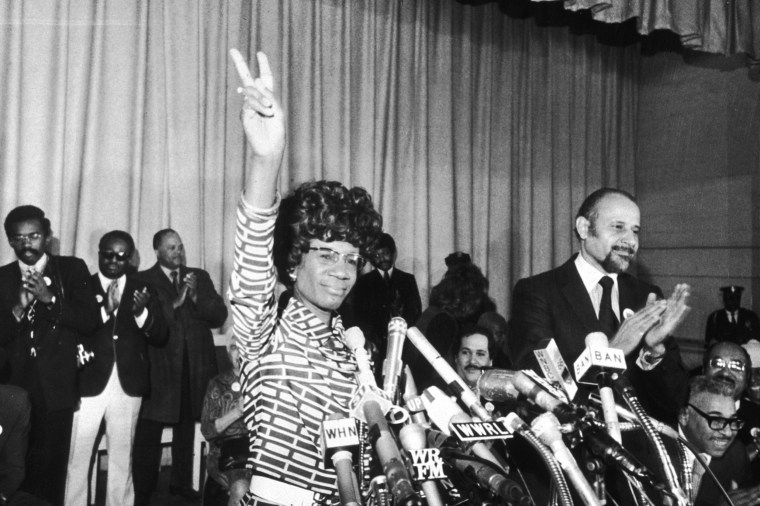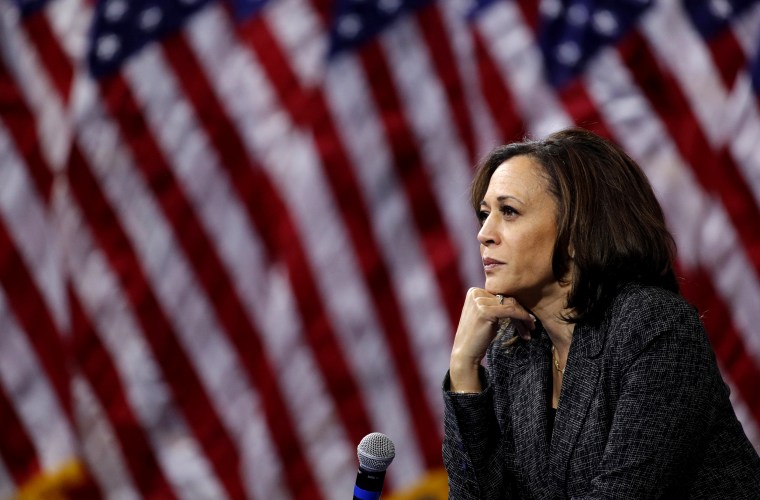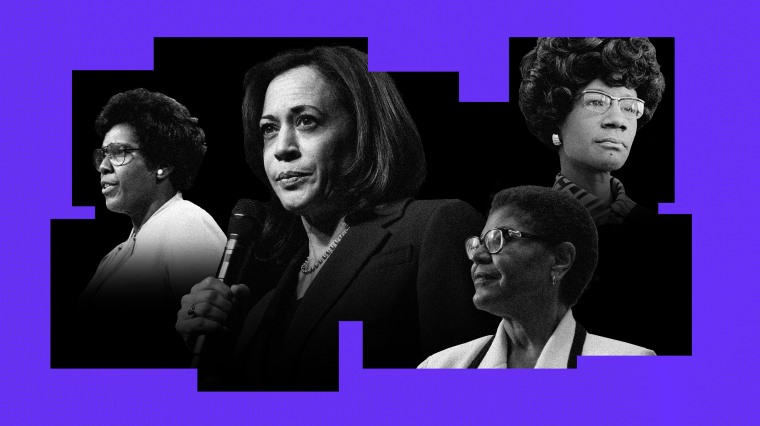In the late 1990s, Stacey Abrams faced a decision.
Abrams was working on a master’s in public policy at the University of Texas-Austin, gleaning all that she could learn from Rep. Barbara Jordan of Texas, the first Black woman elected to Congress by a former Confederate state. Professor Jordan was a woman in possession of a voice, an intellect and a political strategy so resonant that nearly a decade before Geraldine Ferraro’s historic 1984 vice presidential run, Jordan’s name was floated as a potential running mate for President Jimmy Carter.
The man behind the suggestion: Carter adviser, then-Sen. Joe Biden.
For Abrams, Jordan was a personal hero, a guide to the exercise of American political power, and a model of her own ambition. So, when an admissions offer arrived from Yale University Law School, early in Abrams' time at UT, Abrams was torn.
In the end, Abrams opted for law school, completing UT at a distance. A few months after that choice, Jordan died. And Abrams, who this year mounted what’s been described as a remarkably overt, potentially disqualifying campaign to become Biden’s running mate, was among the last students Jordan taught.

Decades later, the Jordan way — outspoken, clear and unapologetic Black women expressing their ideas — and how people respond to it seems poised to become a major theme of the 2020 election. The ascent of Abrams, Sen. Kamala Harris and several other women who practice politics the Jordan way may now lead to the White House.
Biden, who is set to accept the Democratic party’s presidential nomination next week, announced Tuesday that he had chosen Harris, a Black and Indian American woman from California, as his running mate.
The decision has been described as both groundbreaking and pragmatic, the culmination of decades of party loyalty from Black women and the possible end of multiple barriers in American politics. As recently as 2019, 69 percent of all public offices were held by men and 88 percent by white Americans. In other words, a country that can produce a Barbara Jordan can also limit how far and how fast a Barbara Jordan can climb.
The decision to select Harris, an outspoken former prosecutor who tangled with Biden on the presidential campaign trail and directly confronted him about his record on school integration, would seem to suggest that expectations about how Black women must behave in politics are changing. But the Harris pick cannot permanently transform American political culture overnight, experts say.
“You need to understand these women are essentially Afro futuristic,” said Shola Lynch, a filmmaker and the director of the 2004 documentary “Chisholm ʼ72: Unbought and Unbossed,” one of only two extended looks at Rep. Shirley Chisholm’s White House run. Chisholm, the first Black woman elected to Congress, later became the first Black person to seek a major party’s presidential nomination and the first woman to run for president as a Democrat.
“It’s like science fiction,” Lynch continued. “You have to believe that something is possible that no one around you believes is possible. It requires us to deconstruct what it means to be a first, to make visible and appreciate the amount of work not only that individual has to do to see themselves as whole and capable without historic precedent, but the absence of faith, the limits of support and confidence that may come from previous allies. That’s the story of Shirley Chisholm, the story of Black women in politics, and really, what it means to be Black in America.”
A bill has come due
The idea of a Black woman on the Democratic Party’s White House ticket should be understood as not only logical but necessary, said Duchess Harris, a professor of American Studies and political science at Macalester College in Minnesota, who is no relation to the senator.
“A bill has come due,” said Harris, who is the author of the book, “Black Feminist Politics from Kennedy to Trump.” “Black women are the largest and most consistent voting block of the Democratic Party and have been for some time.”
In 2018, Black women delivered victories for Democrats in deep red states like Alabama and could potentially do the same in states like Tennessee this year, said Cliff Albright, a political activist and strategist with Black Voters Matter, a PAC that worked in both states to mobilize record numbers of black voters.
Support for putting a Black woman on the ticket is not limited to Black women. About 48 percent of white women polled and 54 percent of women of color polled in July said that Biden should pick a Black woman as his running mate, according to a survey conducted by the Black women’s political organization Higher Heights for America. Organizations representing Black women and Black men made the same point to the Biden campaign in letters and meetings before the announcement.
Before Biden’s decision to select Harris, among the better-known moments of Black women’s political influence and history is the August 1963 story of Mahalia Jackson’s intervention as Martin Luther King Jr. delivered his “I Have a Dream” speech. At the foot of the Lincoln Memorial overlooking the National Mall, King began to read from a rare set of prepared remarks. Standing just behind him, recovering from her own performance, Jackson, known as “the Queen of Gospel,” cried out: “Tell them about the dream, Martin!”
The rest of King’s still widely misunderstood speech was largely improvised but became essential American political history, said Julia Jordan-Zachery, a professor and chair of the Africana studies department at the University of North Carolina-Charlotte.
“If you listen to recordings, you can really hear the moment his mood shifts, how inspired and elevated that riff was,” said Jordan-Zachery, author of “Shadow Bodies: Black Women, Ideology, Representation and Politics.” “But, we have to allow for the possibility that Mahalia Jackson’s role is so fondly remembered because it affirms this idea that Black women should use our voice and influence. Exercise power only in service and care for others.”
That pattern began early. Maria Stewart was born free, orphaned, widowed and employed as a clergyman’s maid before entering American politics in the late 1820s. Stewart was the first Black woman to give a speech to an interracial audience of men and women in 1832.
Stewart’s critics dismissed her as mere spectacle or a font of seditious chatter. The next year, when she took on racial and gender inequality in a public speech, it was her last. Stewart’s career as a public intellectual on the abolitionist speaking circuit stalled out.
Then, more than a century later, there was the influence of Fannie Lou Hamer, the daughter of sharecroppers who faced harassment and life-altering violence when she and other Black people attempted to register to vote in Mississippi. Hamer finally succeeded at age 46 and played a central role in Freedom Summer, an effort to register Black voters around the South. But, less than a year after the 1963 March on Washington, Hamer’s organizing effectively reset the American political map.
In 1964, Hamer led a Mississippi contingent of Black Democrats to the party’s national convention. Mississippi’s Democratic delegation to the national convention, like others in the South, was for whites only. Hamer and others argued that the national party should not allow that kind of segregationist stranglehold, enforced by threats and violence.
The battle ended with Black representation from some Southern states at the next national convention. The change prompted the party’s most virulent segregationists to decamp for the Republican Party. They took with them a majority of white voters in the American South, part of the nation that remains deep red.

The Voting Rights Act of 1964 not only secured increased access to the ballot box but created new districts where Black candidates were more likely to be elected. By 1968, Lynch said, Shirley Chisholm, a Brooklyn preschool teacher, had recognized what still seems to baffle many political professionals today. She could win a congressional seat by campaigning on the issues and experiences of women like her — working Black women.
Chisholm’s strategy delivered a victory over James Farmer, a well-known Black man and civil rights activist whose campaign had featured drum circles, Black men sharing policy ideas while dressed in Dashikis riding around the district on flatbed trucks. Chisholm’s campaign, which relied heavily on policy discussions with district residents at coffee klatches, was hardly covered in the press, and today, most of the books about Chisholm are written for children.
“The absence of a major biography, even to this day, is important,” Lynch said. “It’s telling. Children’s books operate at a surface and comfortable level that we feel good about sharing with children. It erases our agency and contribution to American history, the degree to which women like Chisholm had to do combat.”
In her presidential announcement speech, Chisholm herself was clear about her aim. She ran without the support of most members of the Congressional Black Caucus, the growing number of Black men leading major cities, or the mostly white feminist establishment.
"I am not the candidate of Black America, although I am Black and proud,” Chisholm said. “I am not the candidate of the women's movement ... although I am a woman and equally proud of that. I am the candidate of the people and my presence before you symbolizes a new era in American political history."
Conditions a crisis helped to create
Years after Chisholm retired from office, other political events also boosted the number of Black women in public office at every level of government, said Harris, the professor. Among the most complex: In the 1980s and ’90s, local, state and federal anti-crime bills, including a 1994 “tough on crime” law that Biden helped write, led to a surge in mass incarceration, particularly of Black men. Biden has described that law, the Violent Crime Control and Law Enforcement Act, as one of his legislative accomplishments.
Among the complex results: Black women went to colleges, law schools and even won local political offices in numbers disproportionate to Black men, Harris said. That is the track that typically leads to Congress or some sort of national political standing.
Karen Bass, now a California congresswoman, began her political career by organizing a community response to the crack epidemic in the 1980s. Kamala Harris graduated from law school in 1989 and became a prosecutor the following year in a county that included Oakland, which was 44 percent Black.
“Black women now have a lineage and a political genealogy that may have escaped some people’s notice,” Harris said. “Chisholm opened the door and created what some would call the politics of possibility, just the image of a Black woman on the Hill. And as the country has changed, Black women have fought for and won a place that is more than public helpmate, private strategist and diligent worker, whether people like that or not.”
Will she be Lani Guinered?

Now that Harris has been named Biden’s running mate, the nation will need to examine the kind of racism and sexism that’s been an acceptable part of stories and conversations about Black women in politics, Duchess Harris said.
Harris said she was concerned that any Black woman running for vice president could experience the fate of Lani Guinier, whose nomination to be assistant attorney general for civil rights was submitted and then withdrawn by President Bill Clinton. After reading Guinier’s writing about how to boost Black political power, Clinton said he could not defend their contents.
“The headline that described this brilliant woman was ‘Strange Name, Strange Hair, Strange Ideas.’ Michelle Obama was Barack’s ‘baby mamma,’” Duchess Harris said. “The list just goes on and on. So hopefully we will expect it, be able to identify it and call it what it is when, not if, it happens.”
Whether it was Guinier with her natural hair, or Michelle Obama’s impressive résumé, dark skin and grounding in Black culture, the image of Black women in public life has habitually been that of a negative and often grasping force, preying on the goodwill and eroding the decency of the nation, said Jordan-Zachery, of UNC-Charlotte.
“Michelle Obama — rightly or wrongly, and I make no judgment— basically renegotiated her identity in order to not be a distraction, the subject of stories suggesting her husband was a dangerous radical. But understand, they rebranded Michelle Obama in order for her not to be a threat to America.”
A long, slow process and the last four years
Nearly four years after the Obamas left the White House, the Black women who are superstars in Congress and many on Biden’s shortlist have done a lot to publicly hold Trump administration figures accountable, Jordan-Zachery pointed out. Kamala Harris, a former prosecutor and state attorney general in California, ranked among those whose confrontations with administration figures have gone viral.
“Imagine how that disrupts narratives of Black womanhood,” Jordan-Zachery said. “The American political body generally does not leave space for Black women who speak their minds. We are expected to speak on behalf of others. And the interesting thing is these women said to be in consideration by Biden, none of them, are really playing politics like that.”
Harris’s place on the ticket, according to Politico, was said to have been imperiled by her open confrontation in the first primary debate with Biden about his record on busing to achieve school integration in the 1970s and the possibility that she may have ambitions beyond the nation’s second-highest office. Those inside the Biden camp who pushed the notion that the right running mate would know her place and want nothing more than to be a helper bee appear to have lost the nomination fight.
“This is life-altering, a Black woman vice president,” said Cornell Belcher, a pollster and political strategist to the Obama campaigns and the only Black person to ever lead polling activity for either major political party.
“No doubt. It is a monumental thing,” said Belcher, founder of Brilliant Corners Research & Strategies. “But what created this moment began more than 60 years ago. You can’t really talk about this moment and not talk about how this is in the continuum of what civil rights protesters, what Freedom Riders got their asses beat for. So, it’s important, no matter the outcome, to remember that with this one battle we have not, you will not, win the war.”

